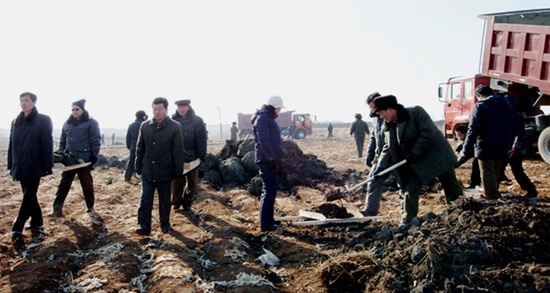 North Korean residents shovel manure on a farm. Image: Uriminzokkiri (North Korean news website) January 12, 2015. |
Every year, North Korea mobilizes its population to contribute manure to the state. As part of wider efforts to compensate for the country’s chronic shortages, the policy is a combination of forced labor and taxation. This year, the authorities have put both ordinary residents and workers associated with the Party and judicial agencies to work. While in years past, party cadres were able to pay bribes in return for exemption from manual labor, this year, the regime is encouraging cadres to “set a good example,” by participating personally.
“Manure production received a particularly strong emphasis this year,” said an inside source from Ryanggang Province during a telephone call with Daily NK on January 26. “In the past, the cadres would show their face at the site for three or four days and then leave, but this year they are required to stay and work on the site for 20 days.”
“Everyone has been ordered to produce 100 kilograms of manure a day, including cadres from the party, the administrative agencies, and the state judicial agencies. Units from the upper echelon organizations have been told to thoroughly control their workers,” the source explained.
According to the source, there has been a special emphasis on the exemplary role that the state’s judicial agencies, including prosecutors, the Ministry of State Security (MSS), and the Ministry of People’s Safety (MPS) need to play. Circumstances have changed dramatically since the previous MSS head, Kim Won Hong, was fired in February last year, with the new leadership at pains to avoid Kim Jong Un’s wrath by not following directives to the word.
Some residents, finally seeing cadres participate fully in the mandatory labor requirements, are happy about the changes.
“Residents who have long been interrogated and investigated by the judicial agencies are saying, ‘The prosecutors, MPS agents, and MSS agents who scream at us need to see exactly how difficult our lives are. They are relieved to see these powerful officials – usually condescending towards residents and constantly searching for new sources of bribery – crying and sneezing as they shovel manure,” the source explained.
Despite the extra participation, the average work quotas for ordinary residents have not been reduced. In fact, in some cases, the pressure has increased this year.
“Normally, the Women’s Socialist Union, the Inminban (neighborhood watch groups), and the factory units will assign a yearly quota. But this year, residents are being assigned daily quotas and getting intensely questioned about their contributions. The upper leadership has passed down guidance that the manure production certification forms cannot be neglected as they were last year,” a source in Kangwon Province said.
Due to the increasingly burdensome orders from the authorities, frequent fights have broken out, with residents accusing each other of manure theft.
“Most residents use their household human waste for their private gardens, so they are making manure for the mobilization order by combining livestock feces, humus soil, and peat. There are so many manure thieves that people are locking up their bathrooms. In some neighborhoods, there are even fights over manure,” the Kangwon-based source explained.
Daily NK also received reports on January 16 from Kangwon Province of burglars reportedly ransacking homes while residents are out on mobilization orders.




















